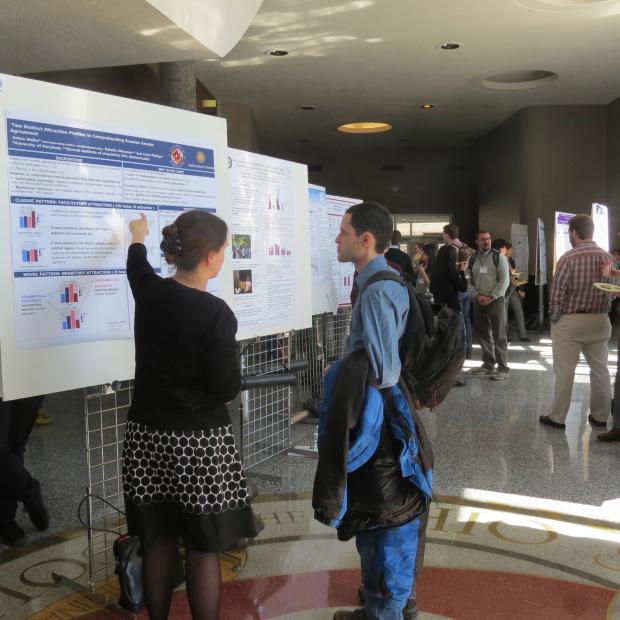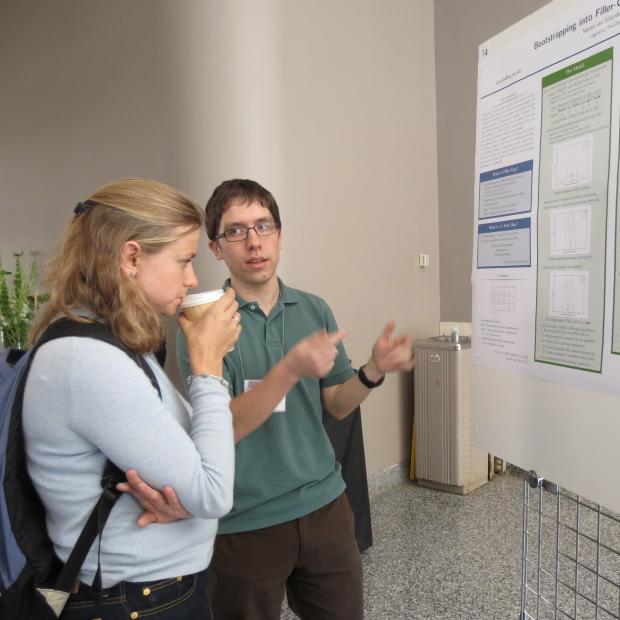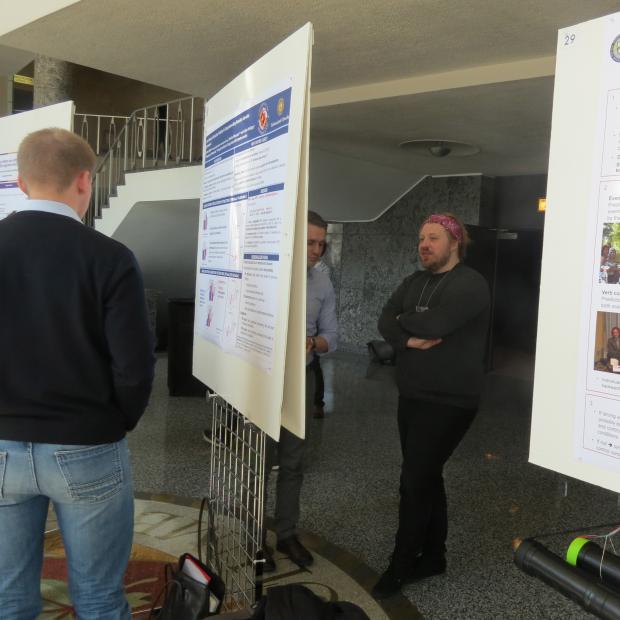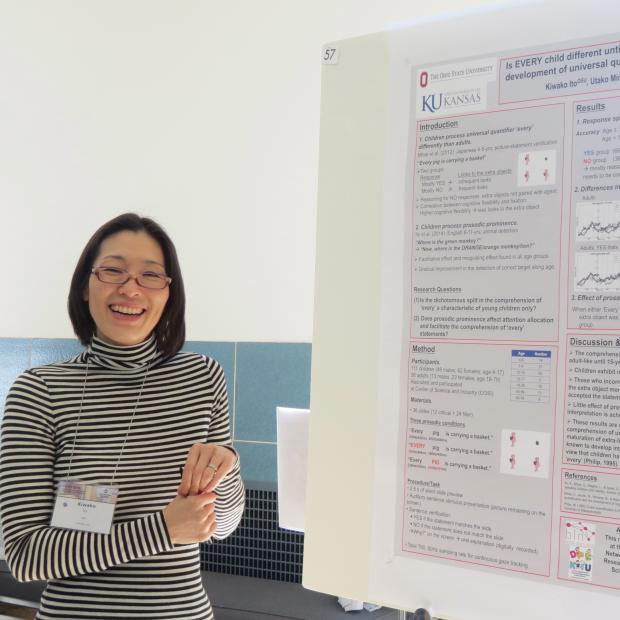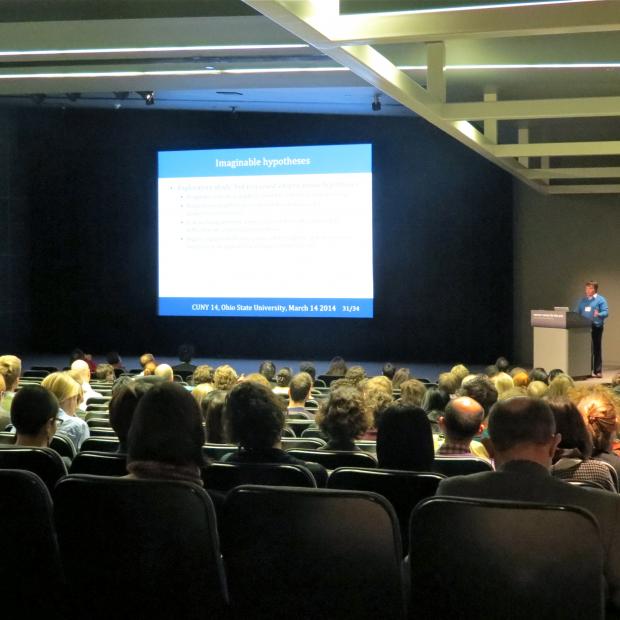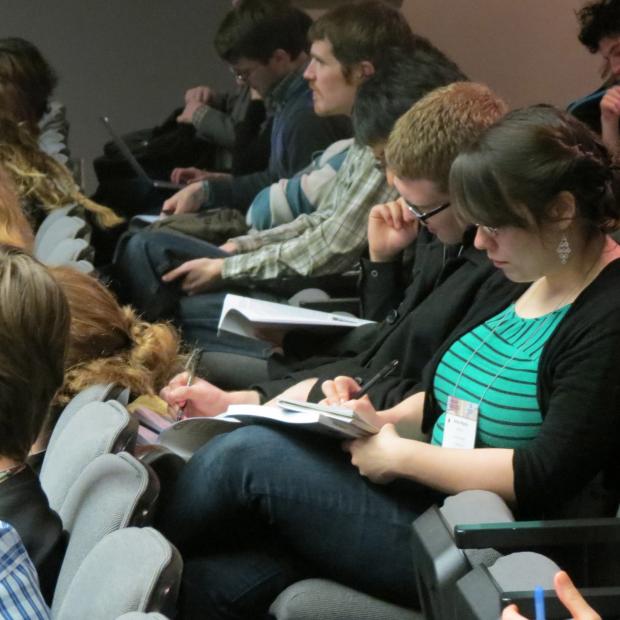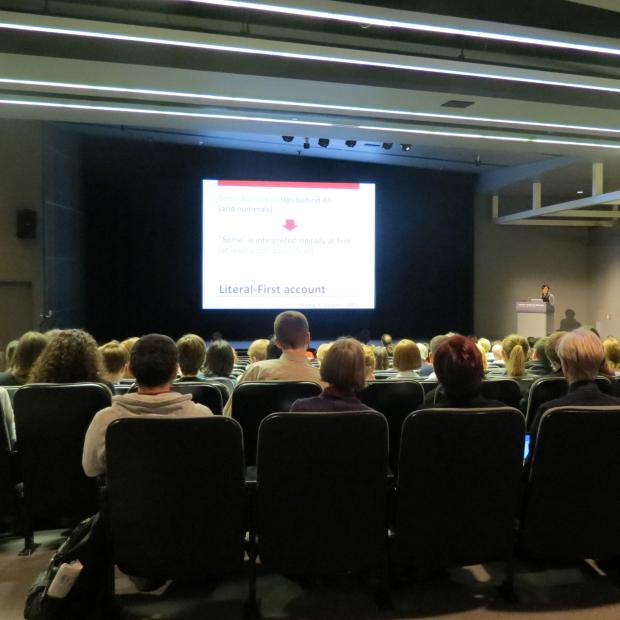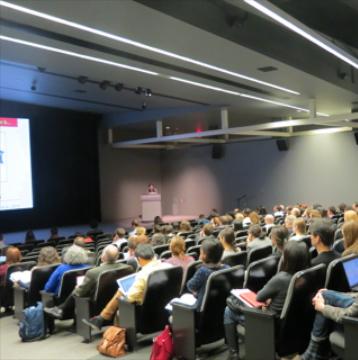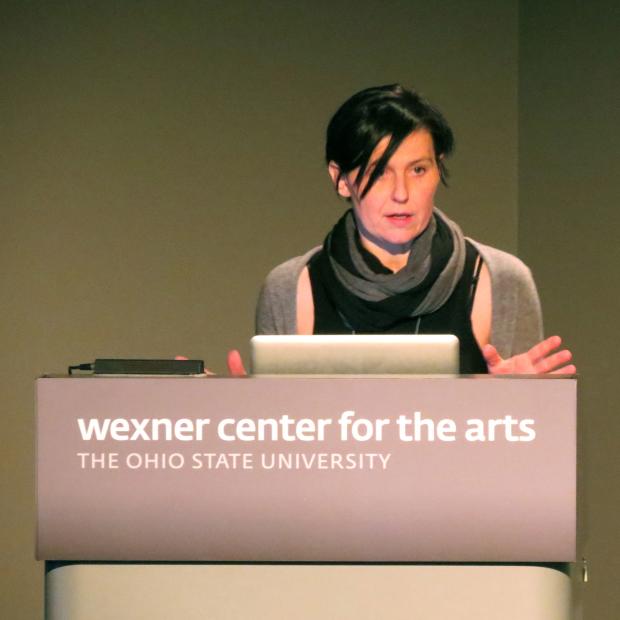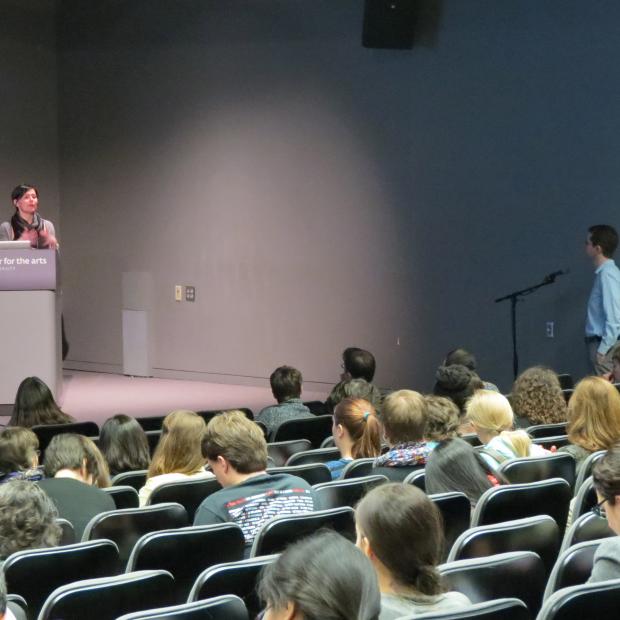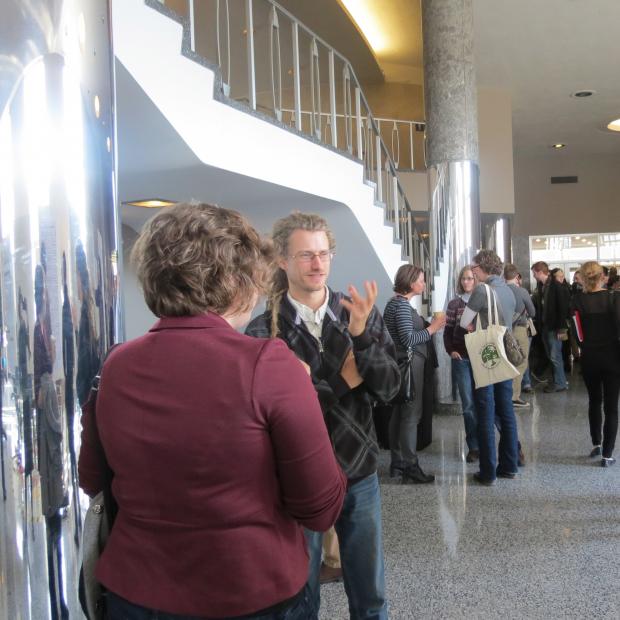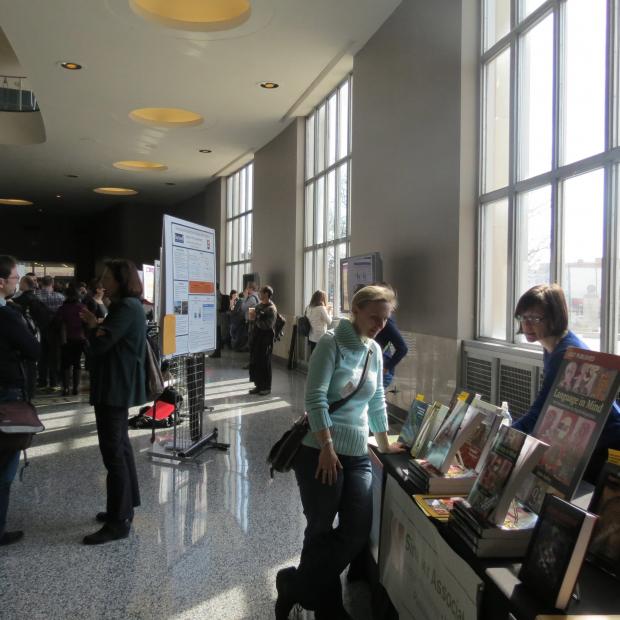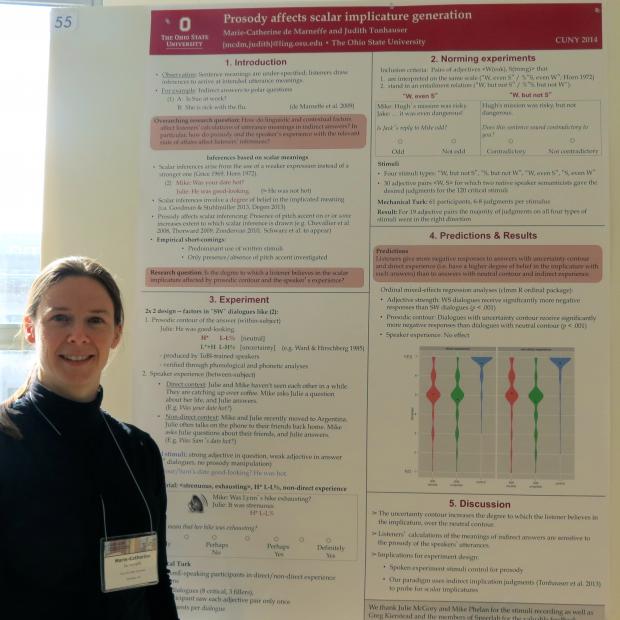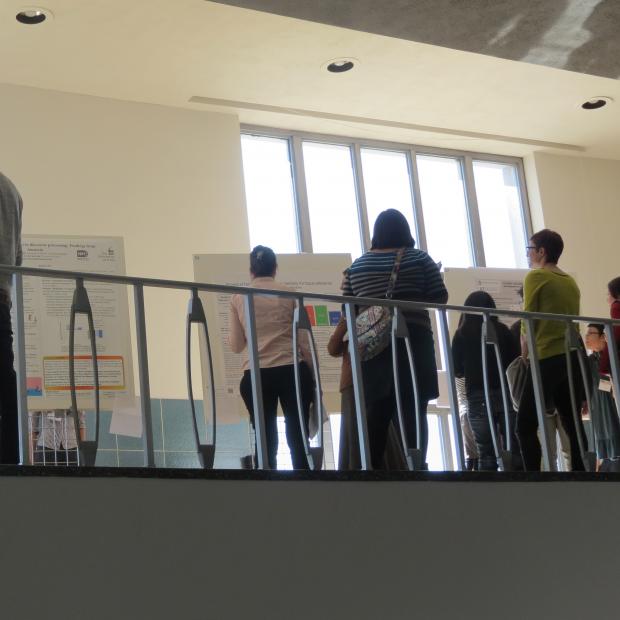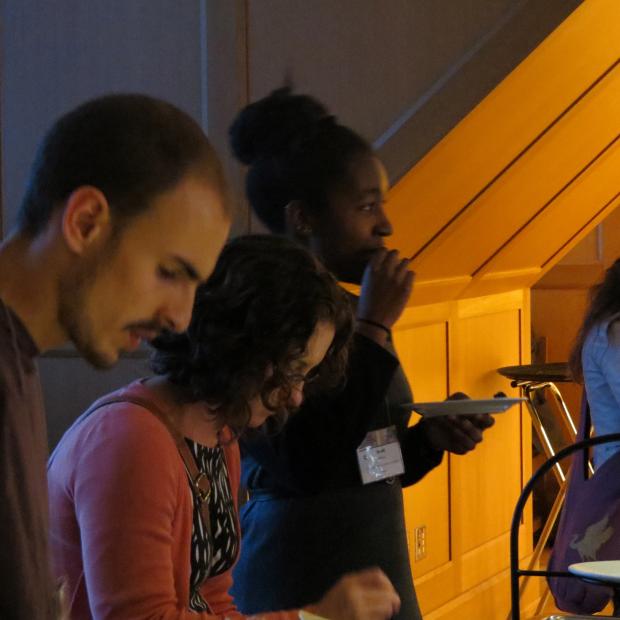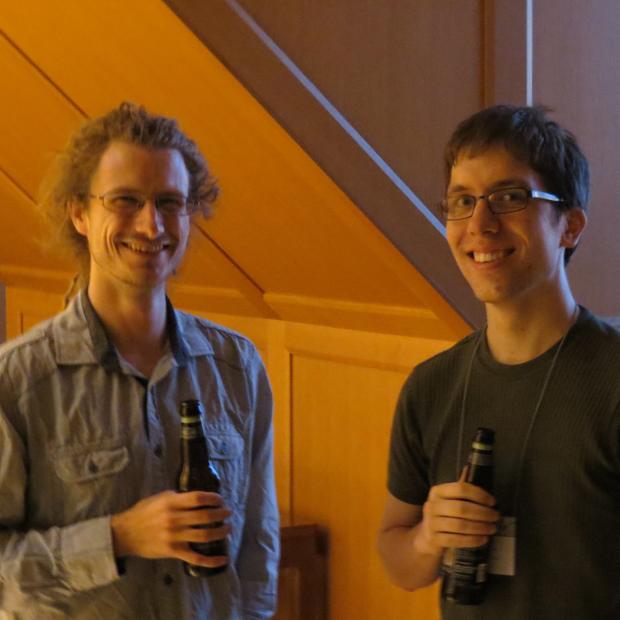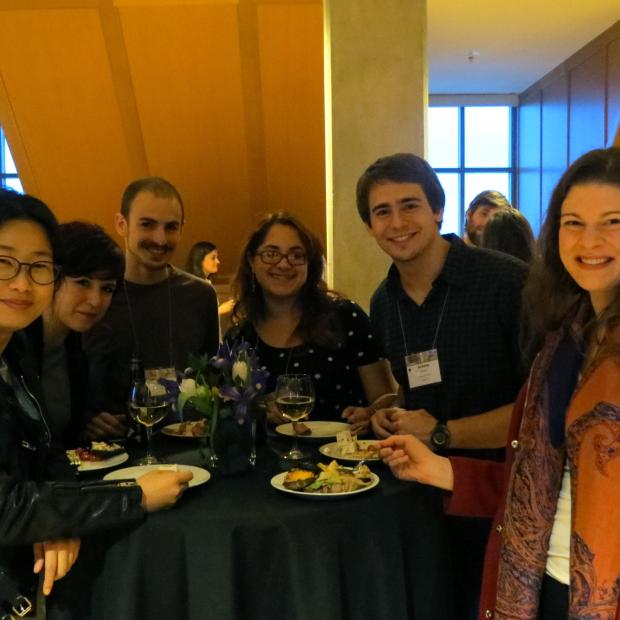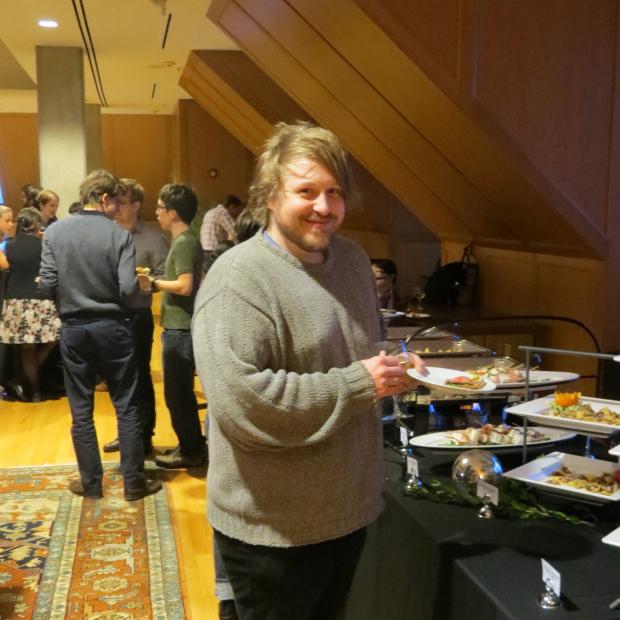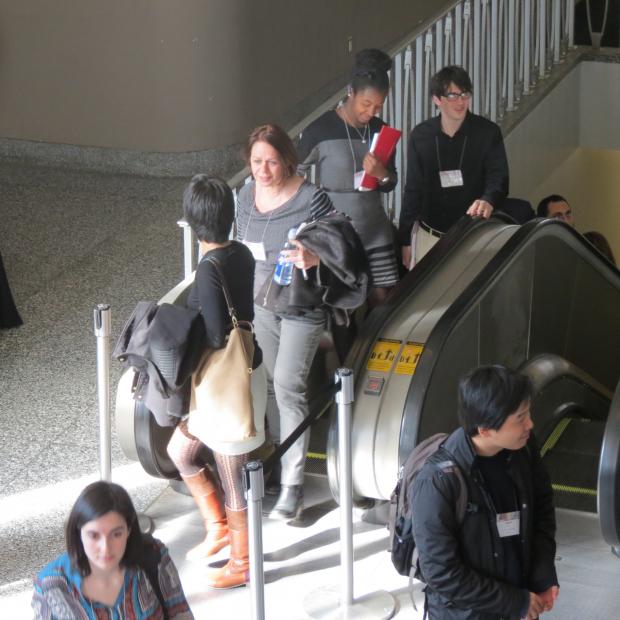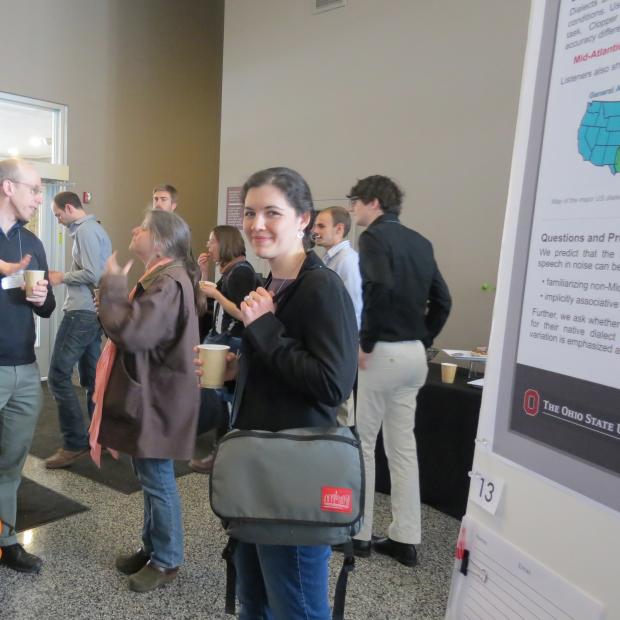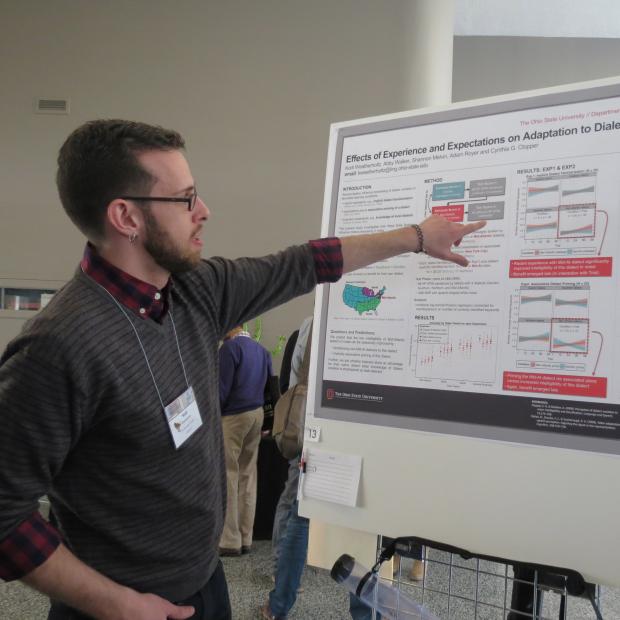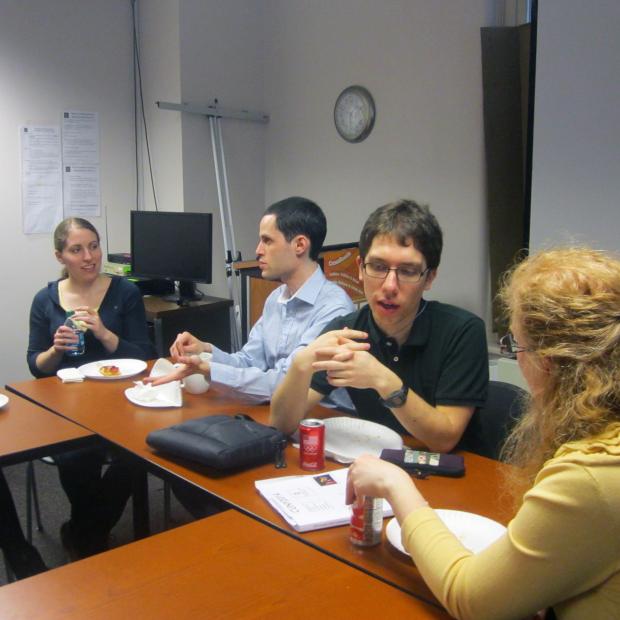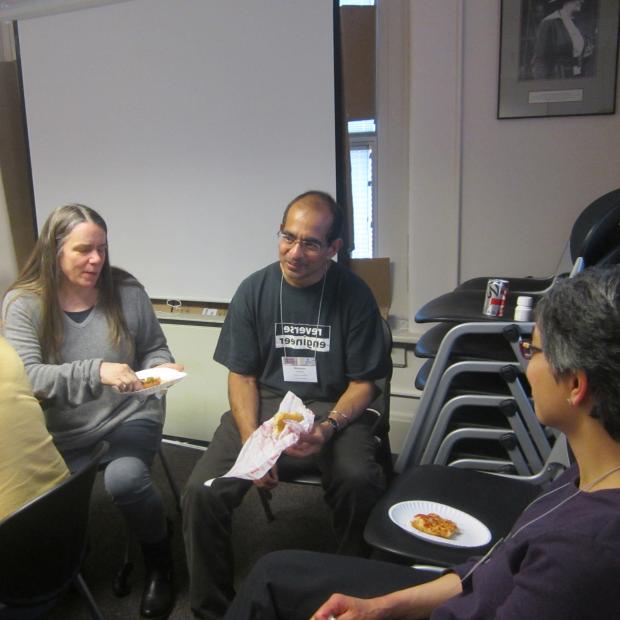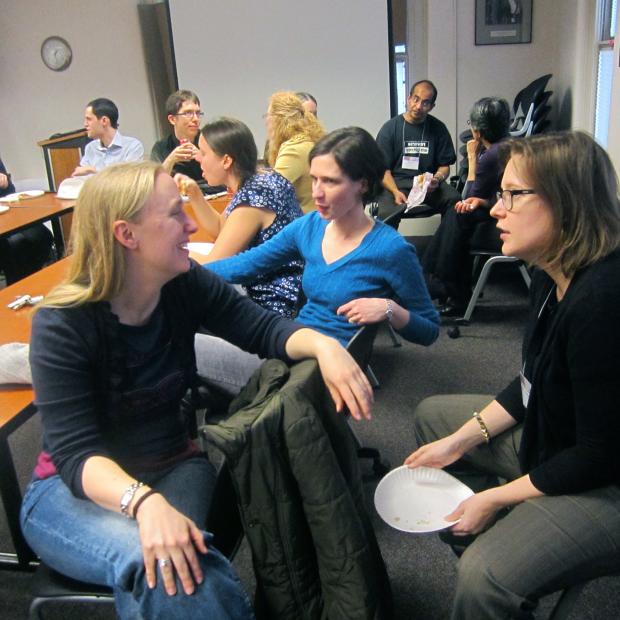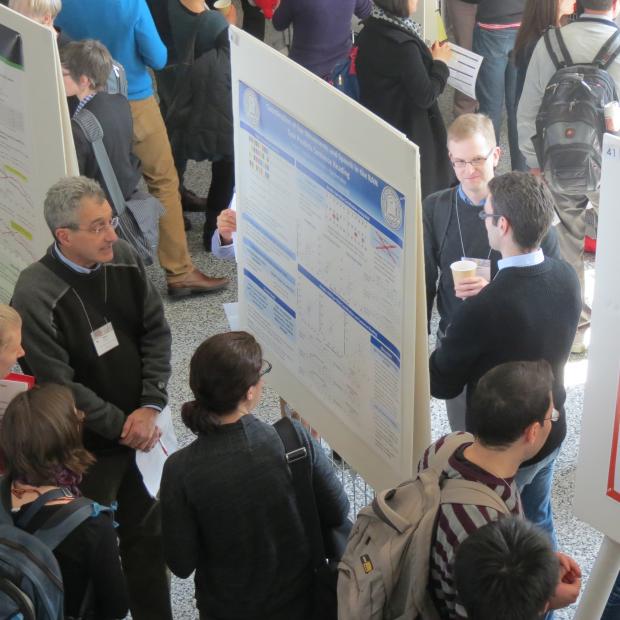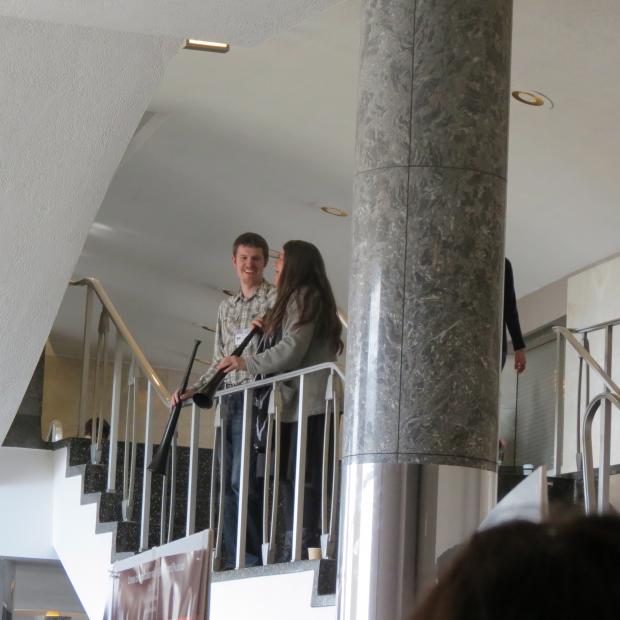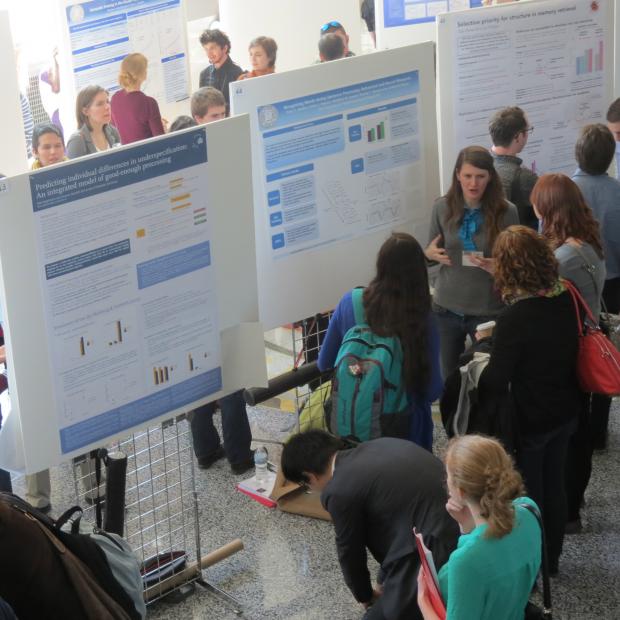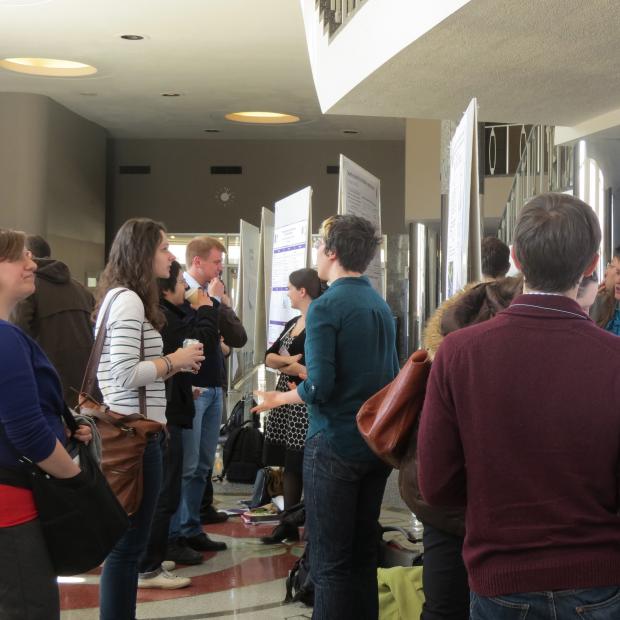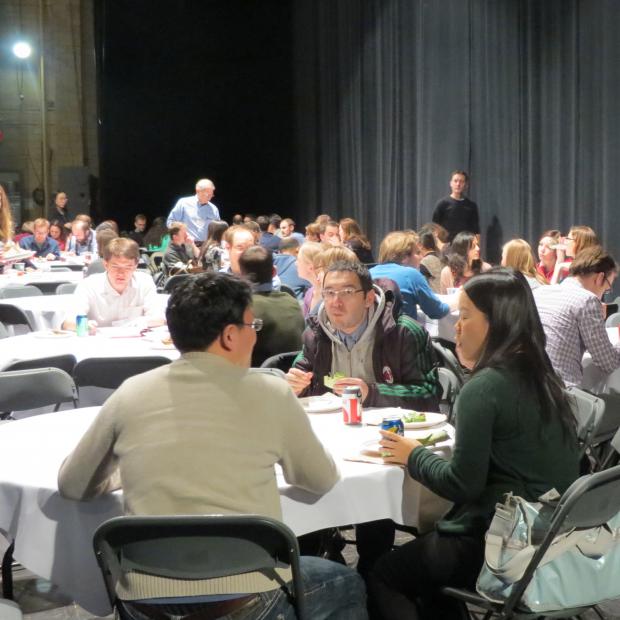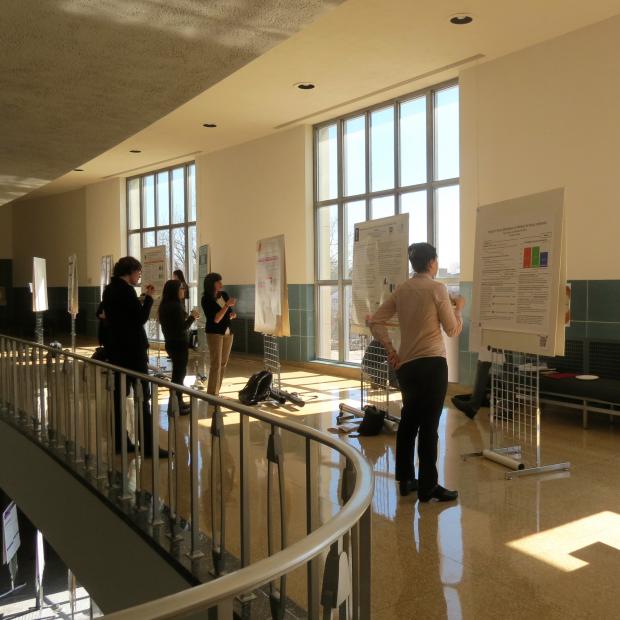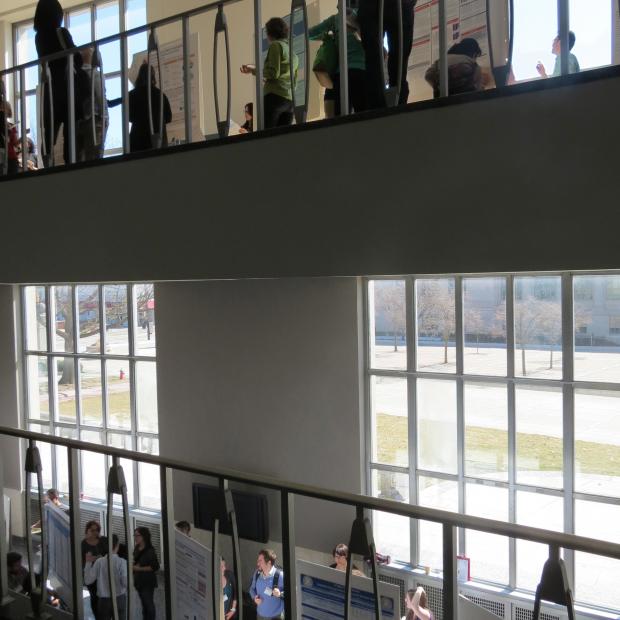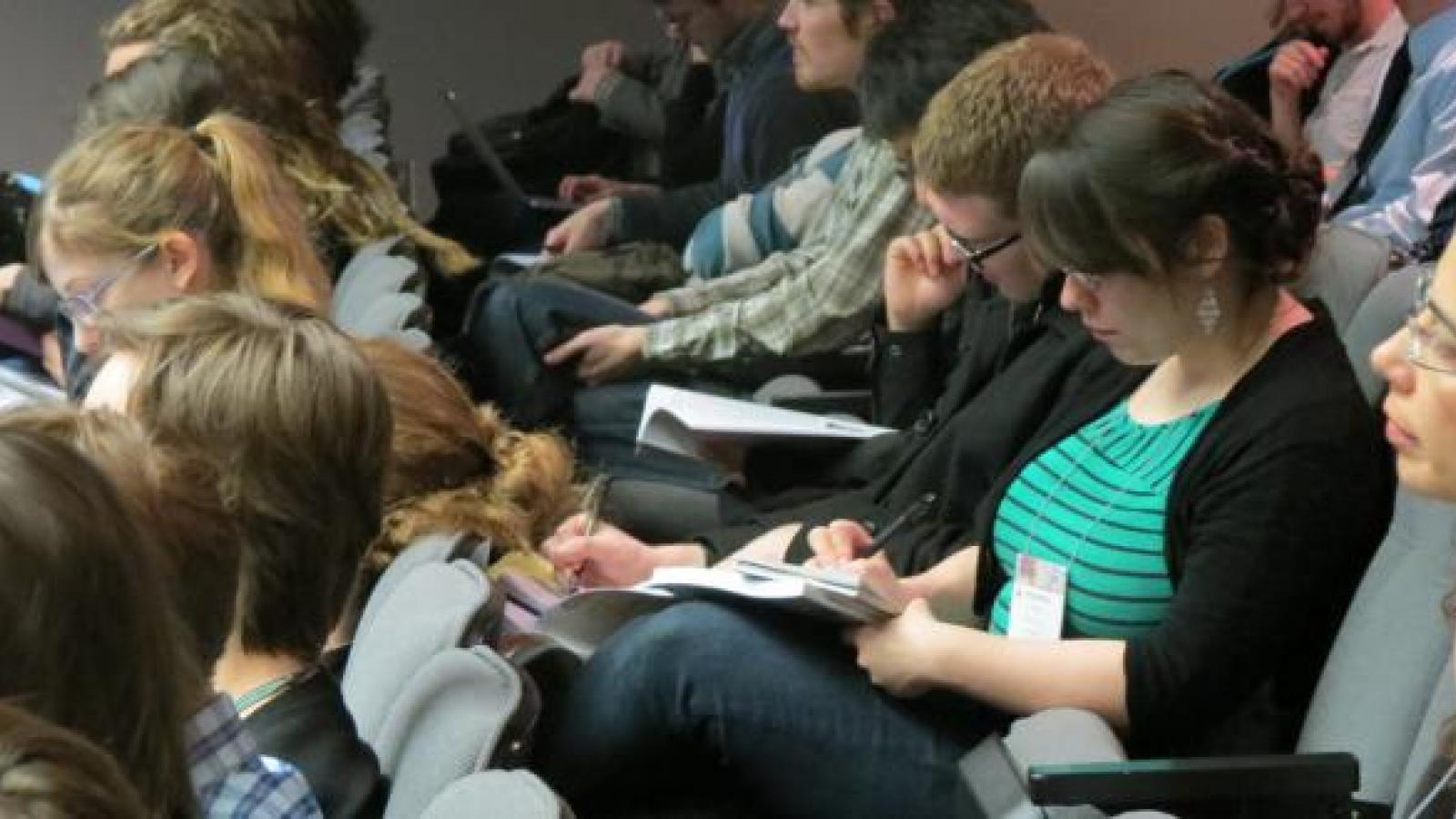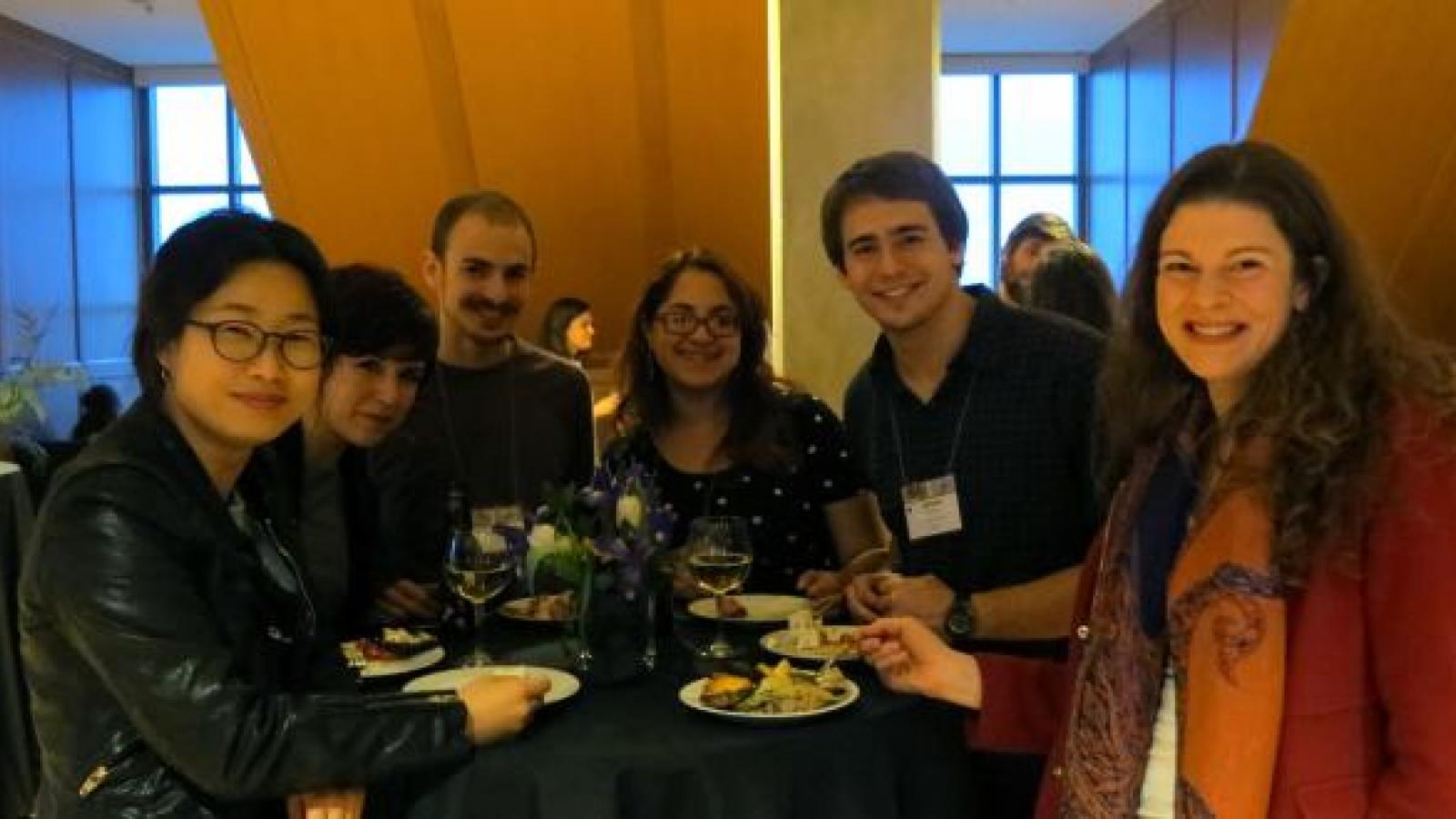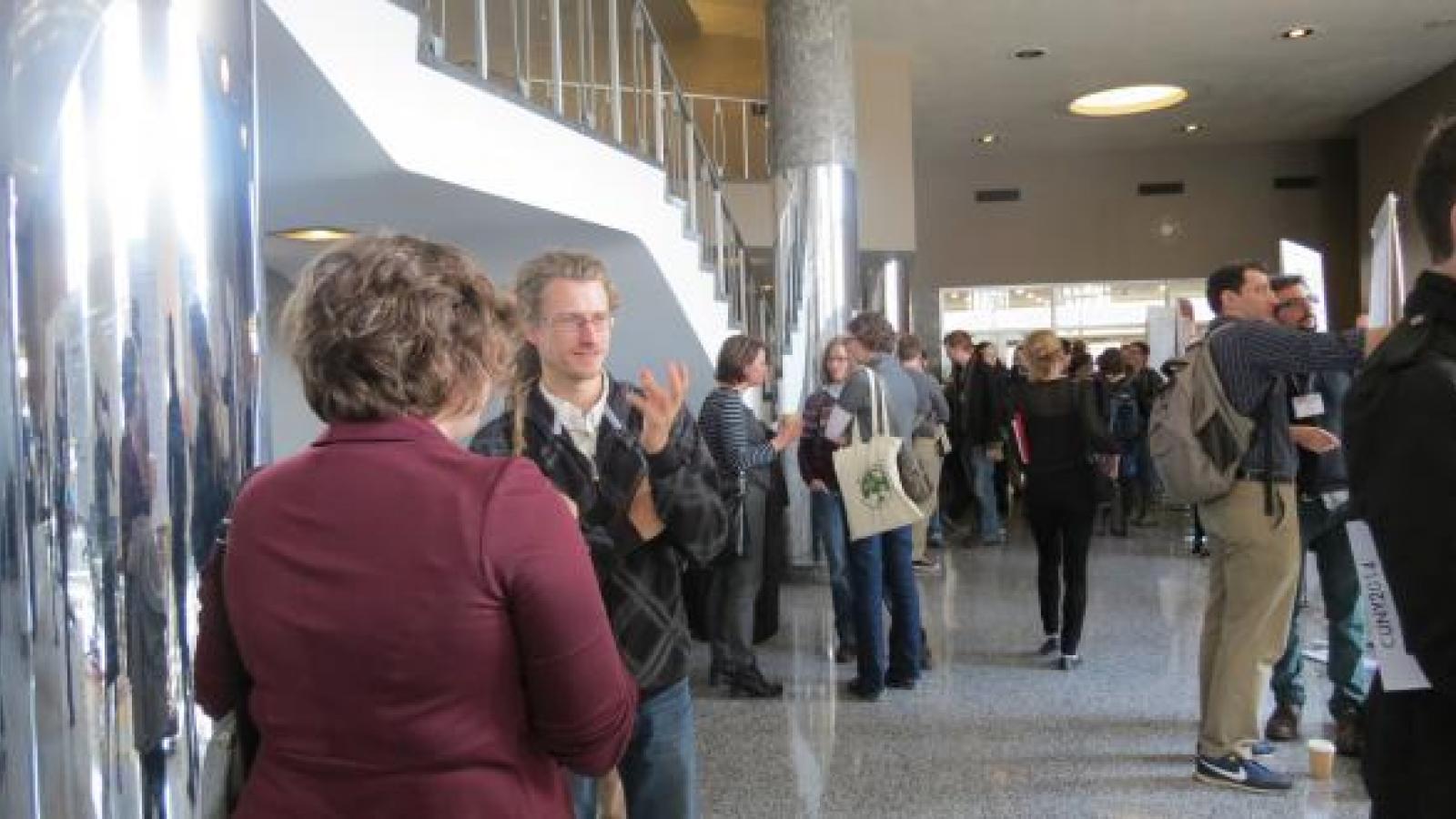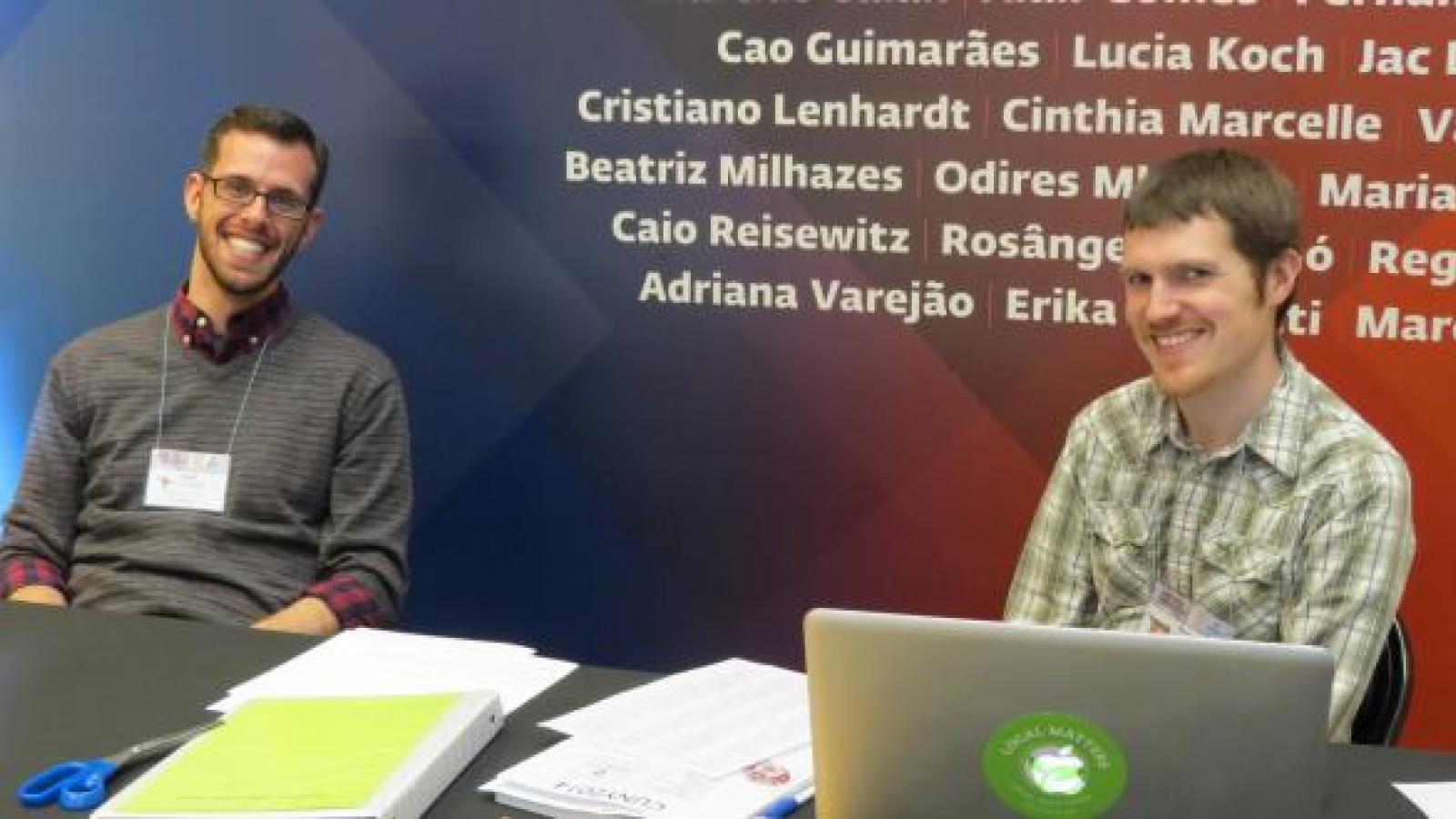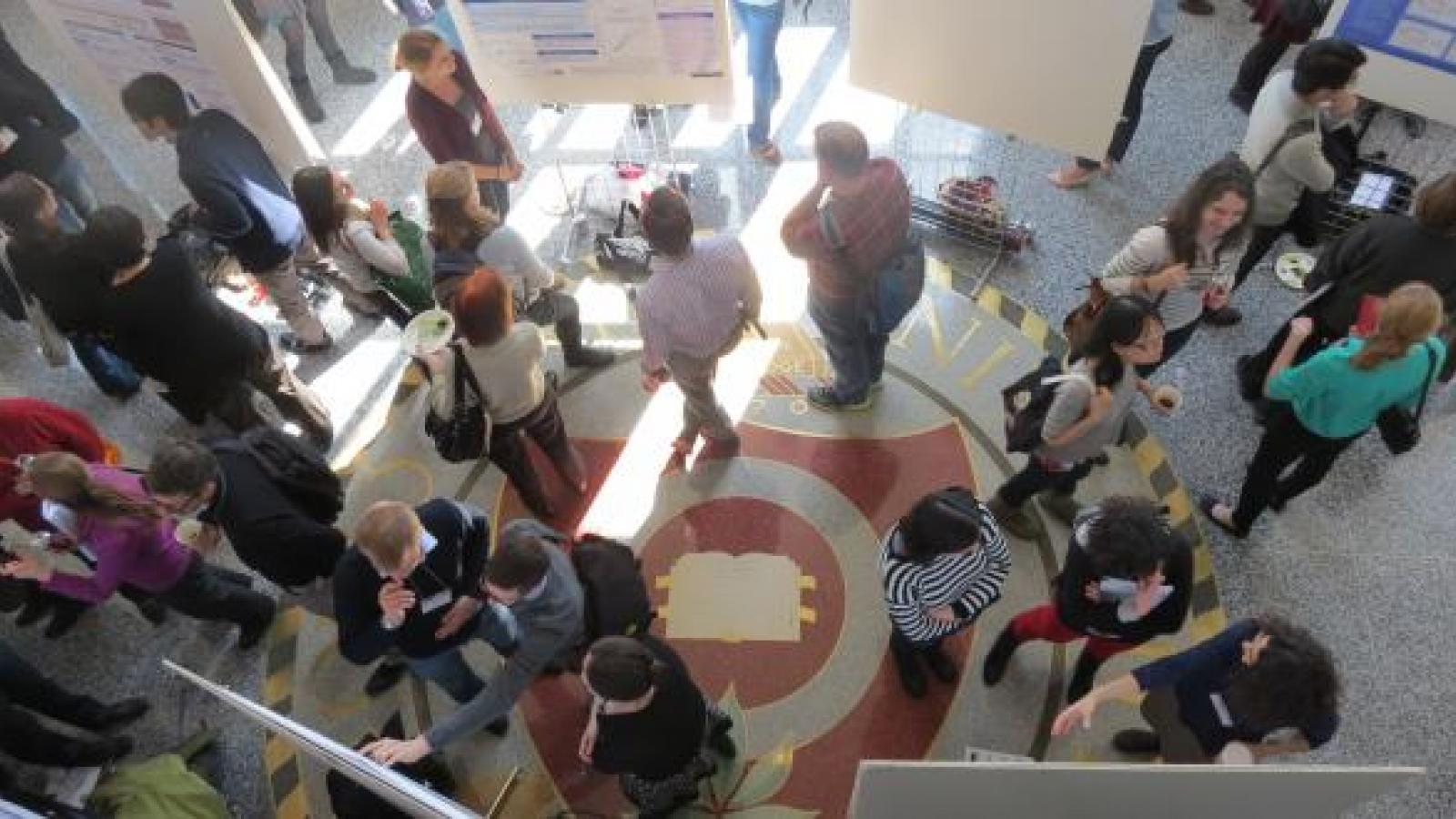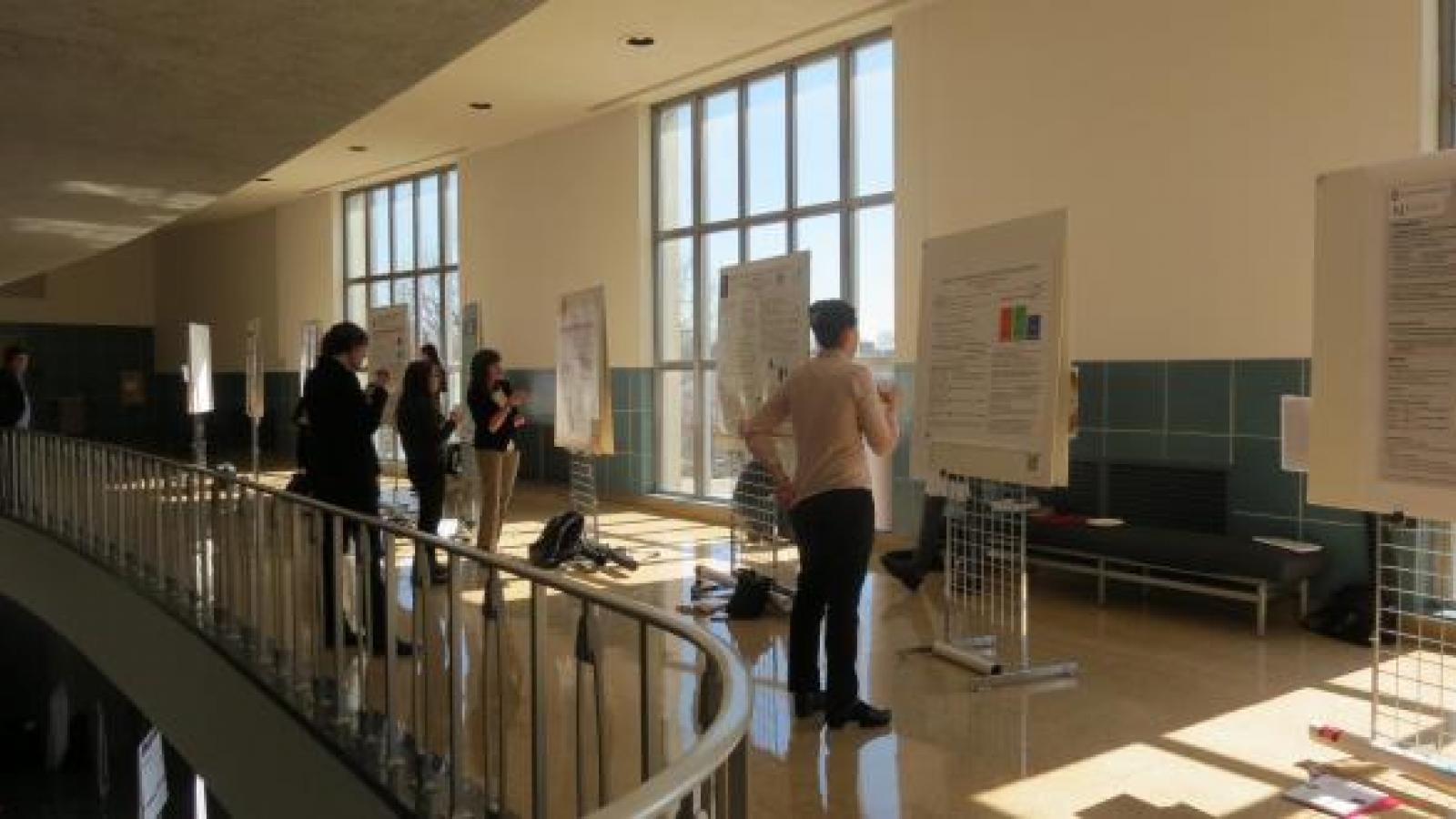CUNY2014 - 27th Annual CUNY Conference on Human Sentence Processing
The 27th Annual CUNY Conference on Human Sentence Processing was hosted by the Ohio State University in Columbus, Ohio, March 13-15, 2014.
The 27th Annual CUNY Conference on Human Sentence Processing was delighted to host the following invited speakers:
- Sarah Creel (UCSD)
- Chris Cummins (Edinburgh)
- Judith Degen (Stanford)
- Chris Potts (Stanford)
- Jesse Snedeker (Harvard)
- Gregory Ward (Northwestern)
Talks and posters marked with ** are part of the Special Session on Experimental Pragmatics.
| THURSDAY | |
| 8:00-8:45 | Breakfast |
| 8:45-9:00 | Welcome |
| 9:00-9:45 | **Characterizing expressive and social meaning with large corpora Chris Potts |
| 9:45-10:15 | The mind leads the eyes: ungrammaticality detection from two words back in reading Klinton Bicknell and Roger Levy |
| 10:15-10:45 | The relationship between regressive saccades and the P600 effect: Evidence from concurrent eye movement and EEG recordings Paul Metzner, Titus von der Malsburg, Shravan Vasishth and Frank Rösler |
| 10:45-11:15 | Break |
| 11:15-11:45 | Unforced revision in the processing of relative clause association ambiguity in Japanese Toshiyuki Yamada, Manabu Arai and Yuki Hirose |
| 11:45-12:15 | Ambiguity affects Mandarin relative clause processing Yaling Hsiao, Jinman Li and Maryellen MacDonald |
| 12:15-12:45 | Underspecification in RC attachment: A speed-accuracy tradeoff analysis Pavel Logačev and Shravan Vasishth |
| 12:45-13:15 | Linear order effects in agreement: Evidence from English wh-questions Brian Dillon, Joshua Levy, Adrian Staub and Charles Clifton |
| 13:15-15:15 | Poster Session I (lunch provided) |
| 15:15-15:45 | The influence of verb-specific featural restrictions, word associations, and production-based mechanisms on language-mediated anticipatory eye movements Florian Hintz, Antje S. Meyer and Falk Huettig |
| 15:45-16:15 | Spillover frequency effects in a sequential sampling model of reading Michael Shvartsman, Richard Lewis and Satinder Singh |
| 16:15-16:45 | Auditory perceptual simulation during silent reading Peiyun Zhou and Kiel Christianson |
| 16:45-17:15 | Gradience and individual differences in processing syntactic, semantic and thematic information: ERP evidence Darren Tanner and Janet G. van Hell |
| 17:15-17:45 | Break |
| 17:45-18:15 | **The contribution of form and meaning to the processing of careful and casual speech. Kevin McGowan, Meghan Sumner, Annette D'Onofrio and Teresa Pratt |
| 18:15-18:45 | **Expectation-adaptation in the incremental interpretation of contrastive prosody Chigusa Kurumada, Meredith Brown, Sarah Bibyk, Daniel Pontillo and Michael Tanenhaus |
| 18:45-19:30 | **Alternatives in pragmatic inference Judith Degen |
| FRIDAY | |
| 8:00-9:00 | Breakfast |
| 9:00-9:45 | **The case of the inconsistent implicature Chris Cummins |
| 9:45-10:15 | **"Not all" comes for free Francesca Foppolo and Marco Marelli |
| 10:15-10:45 | **Some implicatures take their time. An ERP study on scalar implicatures with 'sentence- picture vs. picture-sentence' verification task. Daniele Panizza and Edgar Onea |
| 10:45-11:15 | Break |
| 11:15-11:45 | The local contrast expectation in let alone coordination Jesse Harris and Katy Carlson |
| 11:45-12:15 | Language affects quantity judgments in bilingual Yudja speakers Suzi Lima |
| 12:15-12:45 | Time heals semantic illusions, but not syntactic illusions Dan Parker, Alan Du and Colin Phillips |
| 12:45-14:45 | Poster Session II (lunch provided) |
| 14:45-15:15 | The P600 and the n-back task: Evidence that domain general conflict resolution ability underpins the resolution of garden-paths Polly L. O'Rourke and Gregory J. H. Colflesh |
| 15:15-15:45 | Predictability and filler-gap ordering in dependency formation: An MEG study Kimberly Leiken and Liina Pylkkänen |
| 15:45-16:15 | Facilitatory semantic interference in the processing of long distance dependencies Ian Cunnings and Patrick Sturt |
| 16:15-16:45 | Break |
| 16:45-17:30 | **Demonstrative equatives and the conveyance of speaker (un)certainty Gregory Ward |
| SATURDAY | |
| 8:00-9:00 | Breakfast |
| 9:00-9:45 | **Hearing a who: Preschoolers and adults process language talker-contingently Sarah Creel |
| 9:45-10:15 | **Privileged vs. shared knowledge about object identity in real-time referential processing Mindaugas Mozuraitis, Craig G. Chambers and Meredyth Daneman |
| 10:15-10:45 | **What do you know? ERP evidence for immediate use of common ground during online reference resolution Les Sikos, Sam Tomlinson, Lauren Sanchez and Dan Grodner |
| 10:45-12:45 | Poster Session III (with coffee) |
| 12:45-13:45 | Lunch (on your own) & Eyelink workshop |
| 13:45-14:15 | A cross-linguistic verb-final bias in gesturing paradigms Richard Futrell, Tina Hickey, Aldrin Lee, Eunice Lim, Elena Luchkina and Edward Gibson |
| 14:15-14:45 | Processing of pitch prominence in Williams syndrome Kiwako Ito, Marilee Martens and Erin McKenna |
| 14:45-15:15 | The processing of prosodic focus in French. Jui Namjoshi and Annie Tremblay |
| 15:15-16:00 | **Invited talk Jesse Snedeker |
Experimental Pragmatics: Advancing Theory and Method
Research in pragmatics has shown marked recent theoretical progress. Current research successfully models not only contextual influences from linguistic structure and visually available context, but also factors such as interlocutors, world knowledge, mutually sustained beliefs and intentions. Recent progress in the field can be linked to researchers' ability to leverage novel methods, such as mining multi-interlocutor text interactions in social media, web-crawling language produced and understood via electronic means such as texting, internet blogs and other web-based platforms, and collecting data via Mechanical Turk. These approaches have expanded the available testable hypotheses as well as the diversity and representativeness of the language data under study. Pragmatics theorists have also been particularly open to incorporating insights from experimentally-generated results into developing theories of language interpretation. The special session on Experimental Pragmatics aims to take stock of recent progress in this burgeoning sub-field and help to set the agenda for future research in this domain.
The core of the special session is a series of invited talks by speakers with relevant expertise and diverse backgrounds. We also encourage submissions of talks and posters that address the theme of the special session.
POSTER SESSION I (Thursday):
A bayesian meta-analysis of the Chinese relative clause question
Shravan Vasishth
Abstract structure is active during comprehension of collocations
Erin Conwell and Jesse Snedeker
** Aim low: Speakers design utterances for the most naive addressee
Si On Yoon and Sarah Brown-Schmidt
An effect of verb repetition in the production of head-final passive construction
Lan Jin, Ying Deng, Manabu Arai and Yuki Hirose
Bootstrapping into filler-gap: an acquisition story
Marten van Schijndel and Micha Elsner
Comprehenders mentally represent some aspects of plural entities
Nikole Patson
Computing the structure of questions: Evidence from online sentence processing
Hadas Kotek and Martin Hackl
Coordination of eye movements and speech in the RAN task predicts sentence reading
Peter C. Gordon and Renske S. Hoedemaker
** Definiteness and givenness affect pronoun resolution: Evidence from eye fixations
Klaus von Heusinger, Sofiana Chiriacescu, Andreas Brocher and Tim Graf
** Differences in the prosodic encoding of information structure in closely-related languages
Arunima Choudhury and Elsi Kaiser
** Dissociating neural effects of predictability and incongruity in adjective-noun phrases
Ellen Lau and Anna Namyst
Do the pitch accents or the phrasal accents determine an alternative question?
Samantha Heidenreich, Shari Speer and Carl Pollard
** Effects of context on the processing of adversative and comparative constructions
Grégoire Winterstein, Emilia Ellsiepen, Jacques Jayez and Barbara Hemforth
Effects of interlocutor feedback on speaker phonetic production in a simulated-communication task
Esteban Buz, T. Florian Jaeger and Michael Tanenhaus
** Elaboration of concepts facilitates their retrieval in sentence processing
Melissa Troyer, Philip Hofmeister and Marta Kutas
Encoding and retrieval interference in dependency resolution
Jens Roeser, Lena Jäger, Lena Benz and Shravan Vasishth
Error detection in native and non-native speakers provides evidence for a noisy channel model of aentence processing
Robin Hill and Frank Keller
Event representations in collective and distributive readings: an on-line study
Garrett Smith
Experience with dialectal variants modulates online syntactic comprehension
Scott Fraundorf and T. Florian Jaeger
Exploring socioeconomic differences in syntactic development through processing
Yi Ting Huang, Kathryn Leech and Meredith Rowe
From single words to full sentences
Zeshu Shao and Agnieszka Konopka
Gestures modulate access to referent representations
Stephani Foraker
** Hippocampal contributions to discourse processing: Findings from Amnesia
Sarah Brown-Schmidt, Melissa Duff and Jake Kurczek
Homophone disambiguation & the social identity of the speaker
Julie Boland and Maryam Seifeldin
How sentence processing benefits from the inflectional richness of a language
Sofia Manika
** Impact of focus alternatives on memory for focus referents
Wind Cowles and Michelle Perdomo
Integrating new vs. revising previous input: Local coherences vs. garden paths
Kiel Christianson, Steven G. Luke and Kacey Wochna
Interference effects of pre-verbal NPs on sentence processing in Japanese
Hajime Ono, Miki Obata and Noriaki Yusa
** Is EVERY child different until they turn 15?: Not so quick development of universal quantifier comprehension
Kiwako Ito, Utako Minai and Adam Royer
It takes time to prime: Semantic priming in the ocular lexical decision task
Renske Hoedemaker and Peter C. Gordon
Language processing shapes language change: Redundant cues are less likely to be maintained in language
Maryia Fedzechkina, Elissa L. Newport and T. Florian Jaeger
Learning language from the environment depends on the fitness of both the learner and the environment
Shiri Lev-Ari and Sharon Peperkamp
Listeners maintain and rationally update uncertainty about prior words in spoken comprehension
Klinton Bicknell, Michael Tanenhaus and T. Florian Jaeger
Long-distance attraction effects in SVA processing
Nathan Eversole and Jeffrey Witzel
** Meaning what you say, or saying it the way you mean it: Suprasegmental cues to non-literal meaning
Georgia Simon and Kristen Syrett
Misinterpretation in agreement and agreement attraction
Nikole Patson and E. Matthew Husband
No lexical boost: verb-based information does not facilitate prediction over and above event-based knowledge in the visual world
Evelyn Milburn, Tessa Warren and Michael Walsh Dickey
Non-adjacent lexical dependencies in an artificial language prime relative clause attachment biases
Hao Wang, Mythili Menon and Elsi Kaiser
Online comprehension of object wh-questions: eye-tracking evidence against syntactic gap filling
Olga Dragoy, Maria Ivanova, Anna Laurinavichyute, Anastasia Ulicheva, Svetlana Kuptsova and Lidia Petrova
Online processing of English Which-questions by children and adults: a visual world study
Carla Contemori and Theodoros Marinis
Partial separation of syntactic representations in closely related varieties. Evidence from Swiss German and Standard German
Constanze Vorwerg, Janine Lüthi and Manuel Straessle
** Pragmatic processing costs reflect linking to context, not enrichment
Shevaun Lewis and Colin Phillips
Predicting individual differences in underspecification: An integrated model of good-enough processing
Felix Engelmann and Shravan Vasishth
Predicting L2 lexical pitch accent perception: the role of top-down knowledge in L2 Japanese
Seth Goss and Katsuo Tamaoka
Priming of implicit prosody and individual differences
Sun-Ah Jun and Jason Bishop
Processing filler-gap dependencies in L2: Evidence for the use of subcategorization information
Chie Nakamura, Manabu Arai, Yasunari Harada and Yuki Hirose
** Prosodic encoding of information structure depends on frequency and probability
Iris Chuoying Ouyang and Elsi Kaiser
Recognizing words during sentence processing: Behavioral and neural measures
Peter C. Gordon, Giulia C. Pancani, Matthew W. Lowder, Renske S. Hoedemaker and Mariah Moore
** Restrictive vs. non-restrictive composition: An MEG Study
Timothy Leffel, Miriam Lauter, Masha Westerlund and Liina Pylkkänen
Selective priority for structure in memory retrieval
Dan Parker and Colin Phillips
Sentence completion to the beat: Effects of implicit prosodic rhythm in English and German
Mara Breen and Gerrit Kentner
Shifting viewpoints and discourse economy
Jesse Harris
Skipping syntactically illegal "the"-previews - the role of predictability
Matthew Abbott, Bernhard Angele, Danbi Ahn and Keith Rayner
** Soft and hard presupposition triggers are fast in online processing
Florian Schwarz
The effect of L1 syntax on L2 sentence processing: A self-paced reading study with L2 learners of Chinese
Yun Yao
The interaction of images and text during comprehension of garden-path sentences
Cassie Palmer and Kiel Christianson
The processing and neural basis of argument structure composition through eye-tracking, focal brain-lesion and fMRI
Sara Sanchez-Alonso, Amy Ly, David Braze, Cheryl Lacadie, Todd Constable and Maria Pinango
** The role of working memory in the online realization of scalar inferences
Stephen Politzer-Ahles, Robert Fiorentino, Jeffery Durbin and Lillian K. Li
Turkish-speaking children use verbal morphemes to predict argument structure
Duygu Özge, Jesse Snedeker, Deniz Özkan-Göktürk, Berna Uzundağ and Aylin Küntay
Two distinct attraction profiles in comprehending Russian gender agreement
Natalia Slioussar, Anton Malko and Colin Phillips
** Word order typology and discourse expectation
Eunkyung Yi and Jean-Pierre Koenig
** Young children's comprehension of negation
Tracy Brookhyser, Roman Feiman and Jesse Snedeker
**2.5-year-olds consider presuppositions: An eye-tracking study on TOO and AGAIN
Frauke Berger and Nausicaa Pouscoulous
A common neural basis for syntactic and non-syntactic conflict-control
Nina Hsu, Susanne Jaeggi and Jared Novick
Abstract agreement: Children's sensitivity to subject-verb agreement in comprehension does not require knowledge of specific lexical co-occurrences.
Cynthia Lukyanenko and Cynthia Fisher
Acceptability, statistical distribution, and non-usage-based mechanisms in processing null pronouns, overt pronouns, and repeated names in Brazilian Portuguese
Jefferson de Carvalho Maia, Maria Luiza Cunha Lima, Amit Almor and Carlos Gelormini Lezama
Antecedent contained deletions in native and non-native sentence processing
Oliver Boxell, Claudia Felser and Ian Cunnings
Auditory perceptual simulation of child-directed speech in silent reading
Zhiying Qian, Mallory Stites and Kiel Christianson
** Before and after, and processing presuppositions in discourse
Ming Xiang, Emily Hanink and Genna Vegh
Beyond syntax: Effects of verb semantics and perspective taking on Chinese reflexives
Xiao He and Elsi Kaiser
** Cognitive resources underlying scalar implicature: A subclinical study
E. Matthew Husband and Nicholas Angelides
Complement coercion as aspectuality: Evidence from SPR and fMRI
Yao-Ying Lai, Cheryl Lacadie, Todd Constable, Ashwini Deo and Maria Piñango
Contrast-driven phonetic variation in English and Russian
Clara Cohen
Contributions of hippocampal-dependent declarative memory to on-line processing of global syntactic ambiguity
Sarah Brown-Schmidt, Zhenghan Qi and Melissa Duff
Delaying verb production changes what matters in subject-verb agreement
Arielle Allentoff and Heidi Lorimor
Effects of animacy and noun-phrase relatedness on the processing of complex sentences
Matthew Lowder and Peter C. Gordon
Effects of animacy and semantic relatedness during sentence processing: An ERP study
Mariana Vega-Mendoza, Martin Pickering and Mante Nieuwland
Effects of experience and expectations on adaptation to dialect variation in noise
Kodi Weatherholtz, Abby Walker, Shannon Melvin, Adam Royer and Cynthia Clopper
Efficient communication forward and backward
Richard Futrell, Kyle Mahowald, Steve Piantadosi and Edward Gibson
** Exhaustivity and polarity-mismatch
Aron Hirsch
Eye-movements during reading reflect subsequent sentence memory: evidence from subject and object relative clauses
Brennan Payne, Ariel James, Elizabeth Stine-Morrow and Duane Watson
** Focus preferences for focus-sensitive particles (and why)
Jesse Harris and Katy Carlson
Gender agreement errors in learner English: Evidence from Production and Comprehension
Lucia Pozzan, Inés Antón-Méndez and John Trueswell
Great expectation follows big surprise: Direct evidence for syntactic adaptation from eye-movements
Manabu Arai and T. Florian Jaeger
Impact of phonological distance on lexical ambiguity resolution in people with and without aphasia
Maria Ivanova, Anna Laurinavichyute, Olga Dragoy, Anastasia Ulicheva and Svetlana Kuptsova
** Indirect scalar implicatures are neither scalar implicatures nor presuppositions (or both)
Cory Bill, Jacopo Romoli, Florian Schwarz and Stephen Crain
Intrusion effects on NPI licensing in Turkish: Does the parser ignore the grammar?
Aydogan Yanilmaz and John Drury
Listeners update probabilistic percepts of (a) function word(s) several syllables downstream
Meredith Brown, Laura C. Dilley and Michael K. Tanenhaus
Locality in filler-gap dependencies: Evidence from extraposition
Brian Dillon
Mapping the kindergarten-path: Cognitive predictors of child sentence processing
Kristina Woodard, Lucia Pozzan and John C. Trueswell
Morphology aids syntax in noisy sentence processing
Gaurav Kharkwal and Karin Stromswold
** Neural correlates of realizing scalar inferences: An MEG study
Stephen Politzer-Ahles
Online processing of parasitic gaps: Evidence from eye-tracking
Cassandra Chapman
Partial use of available information in the early stages of verb prediction
Wing Yee Chow, Glynis MacMillan, Shefali Shah, Ilia Kurenkov, Ellen Lau and Colin Phillips
** Pragmatic fit and the processing of Korean honorifics
Hong Mo Kang, Jean-Pierre Koenig and Gail Mauner
** Pragmatic inferencing across scales: Linguistic and extra-linguistic effects
Yi Ting Huang
Priming competes with syntactic anticipation, both within and across languages: Evidence from the Visual World Paradigm
Francesca Filiaci, Thomas Bak, Frank Keller and Antonella Sorace
** Priming enriched meanings
Lewis Bott and Emmanuel Chemla
Processing asymmetries between Subject-Only and VP-Only
Martin Hackl, Erin Olson and Ayaka Sugawara
Processing at the semantic and syntactic interface in learners of Spanish: evidence from ERPs
Carla Contemori, Patricia Roman and Giuli Dussias
Processing resumptives in Mandarin relative clauses: An eye-tracking study
Li-Hsin Ning, Kiel Christianson and Chien-Jer Charles Lin
** Processing scalars
Mandy Simons and Tessa Warren
** Prosody affects scalar implicature generation
Marie-Catherine de Marneffe and Judith Tonhauser
** Rapid inference of intended information transfer rate in conversation
Mark Myslín
** Recognizing what-is-said versus what-is-implicated
William Horton, Chris Schmader and Gregory Ward
Reduction in duration depends on articulation, not simply facilitated processing
Cassandra L. Jacobs, Duane Watson and Gary S. Dell
Relative clause processing and competing pressures in an agreement-rich language
Manuel F. Borja, Sandra Chung and Matt Wagers
Resumptive pronouns and structural complexity in Cantonese relative clause production
Elaine Francis, Charles Lam, Carol Chun Zheng, John Hitz and Stephen Matthews
Resumptive pronouns salvage island violations in forced-choice tasks
Lauren Ackerman, Michael Frazier and Masaya Yoshida
Semantic relatedness and semantic integration in subject-verb agreement errors
Darrell Penta and Neal Pearlmutter
Semantics overrides syntax in the processing of gap-filler dependencies in Chinese
Shukhan Ng and Nicole Wicha
Sensitivity to online encoding and retrieval interference in younger and older adults
Dave Kush, Clinton L. Johns and Julie Van Dyke
Skewed lexical distributions facilitate recursion learning in an artificial grammar task
Pyeong Whan Cho, Garrett Smith and Whitney Tabor
Structural and non-structural locality effects in Bangla filler-gap dependencies
Dustin Chacón, Mashrur Imtiaz, Shirsho Dasgupta, Sikder Monoare Murshed, Mina Dan and Colin Phillips
** The cognitive and neural basis of pragmatic processing: A case study of jokes
Evelina Fedorenko, Jeanne Gallée and Zuzanna Balewski
** The cost of pragmatic inference in the production of referring expressions
Peter Baumann
** The effect of inferred explanations in a Bayesian theory of pronominal reference
Andrew Kehler and Hannah Rohde
The effect of syntactic category on advance planning in sentence production
Shota Momma, Robert Slevc and Colin Phillips
There's more to a sentence than its words: Repetition priming in sentences and lists
Giulia C. Pancani, Peter C. Gordon and Joseph Hopfinger
Timing of lexical activation in determiner–adjective–noun phrase production
Amy DiBattista and Neal Pearlmutter
Understanding ambiguous idioms in context: Clearing the air on compositional and noncompositional views
Nyssa Z. Bulkes and Christopher M. Grindrod
Verb-initial structures in Arabic: Qualitative ERP differences between singular and plural subjects.
R. Muralikrishnan and Ali Idrissi
Working-memory capacity modulates antilocality effects in syntactic dependencies
Bruno Nicenboim, Shravan Vasishth, Reinhold Kliegl, Carolina Gattei and Mariano Sigman
Yo pienso, tu piensas: Crosslinguistic agreement effects in comprehension
Sol Lago, Diego Shalom, Mariano Sigman, Ellen Lau and Colin Phillips
POSTER SESSION III (Saturday):
A chunk of coffee: an event-related brain potential (ERP) study on the processing of Mandarin classifiers
Zhiying Qian and Susan Garnsey
A multiple argument overlap boost in Japanese structural priming
Hiroko Yamashita and Franklin Chang
A speed-accuracy tradeoff study of poor readers' memory mechanisms
Clinton L. Johns, Julie Van Dyke and Dave Kush
Animacy and the active construction of filler-gap dependencies in relative clauses
Emily Pendleton and Matt Wagers
Anti-locality preference in the processing of Japanese reflexive binding
Akira Omaki, Brian Dillon, Takuya Kubo, Manami Sato and Hiromu Sakai
Attuning to cohesion: English count-syntax, the Mandarin general classifier ge, and wholeness
Jessica Harding and Charles Lin
Bad, or just less good? ERPs of processing Arabic agreement violations for plural subjects.
Ali Idrissi and R. Muralikrishnan
Capturing psycholinguistic processing effects using Amazon Mechanical Turk
Kelly Enochson and Jennifer Culbertson
Continuous acoustic information trickles up; discourse information trickles down
Sarah Brown-Schmidt and Joseph Toscano
Cross-linguistic differences in processing double-embedded relative clauses: working-memory constraints or language statistics?
Stefan L. Frank, Shravan Vasishth and Thijs Trompenaars
Decoding the semantics of words in sentences from neural activity
Alona Fyshe, Erika Laing, Nicole Rafidi, Kai-Min Chang and Tom Mitchell
** Determining necessary and possible values: An online study of modals and superlative modifiers
Yaron McNabb and Doris Penka
Effects of integration in eye tracking
William Schuler and Marten van Schijndel
** Effects of morphological and prosodic focus cues on topic maintenance in Korean
Kitaek Kim, Theres Grüter and Amy Schafer
Effects of repeated exposure on sentence processing time: Object relatives and "early closure" ambiguities
Matt Traxler and Kristen M. Tooley
Effects of the second language on syntactic processing in the first language
Giuli Dussias, Lauren Perrotti, Matt Brown and Luis Morales
ERP indices of predictive processing
Edith Kaan, Evan Carlisle, George Collins, Nicholas Feroce and Amalia Reyes
Eye movements reflect the cognitive reality—and costs—of event structure during reading
Benjamin Swets and Christopher Kurby
Eye-tracking and event-related potential effects of transposed letters during compound word comprehension: Do morphemes matter?
Mallory Stites, Kara D. Federmeier and Kiel Christianson
** Generating implicatures from English NPs of the form a/an X: Generalized or local?
Li-Hsin Ning and Marina Terkourafi
Grammatically-guided resolution of filler-gap dependencies: An investigation of Chinese multiple dependencies
Jie Liu, Robert Fiorentino and Alison Gabriele
Implicit agents in short passives and remote control of reason clauses
Michael McCourt, Aleksandra Fazlipour, Ellen Lau and Alexander Williams
Implicit prosody primes appropriately intonated auditory probes
Anouschka Foltz, Cody Linne and Shari Speer
Increased linguistic focus leads to increased reading times
Matthew Lowder and Peter C. Gordon
** Influence of visual complexity on referring expression generation
Hannah Rohde, Alasdair Clarke and Micha Elsner
** Influencing persistence of meanings in entailment-obstructing grammatical environments
E. Allyn Smith and Kathleen Currie Hall
Intrinsic differences in the processing of singular and plural pronouns
Mahayana C. Godoy and Cíntia Antão
Language processing skill is not a unitary construct: Infants’ vocabulary knowledge drives lexical and sentence processing
Arielle Borovsky, Erica Ellis, Julia Evans and Jeffrey Elman
** Lexical entrainment in deceptive interaction
Alessia Tosi, Holly Branigan, Adam Moore and Martin Pickering
Local coherence effects and crossing reflexive- and wh-dependencies
Michael Frazier, Peter Baumann, Lauren Ackerman, David Potter and Masaya Yoshida
Locality and anti-locality effects in the processing of expected and unexpected Inputs: A study of NPI dependencies in Japanese
Kentaro Nakatani
** Mechanisms of prosody production: Differences between children with and without ASD.
Jennifer E. Arnold, Elise C. Rosa, Mark Klinger, Patrick Powell, Alison Meyer
Memory for what was said in conversation: Speakers and Listeners differ
Si On Yoon and Sarah Brown-Schmidt
The Middle matters the most: The effect of phonological similarity on referring forms
Hossein Karimi and Fernanda Ferreira
Noun-phrase-internal structural priming in a picture-description task
Amy DiBattista and Neal Pearlmutter
** On questions and speaker ignorance
Xiaobei Zheng and Richard Breheny
On-line sentence reading in people with aphasia: Evidence from eye tracking
Gayle DeDe and Jessica Knilans Flax
OV-VO yield imperfect mirror-images: On the impact of length on sentence word order
Idoia Ros, Mikel Santesteban, Kumiko Fukumura and Itziar Laka
** Pragmatic influences on the processing of ACD relative clauses
Edward Gibson, Polly Jacobson, Peter Graff, Kyle Mahowald, Evelina Fedorenko and Steven Piantadosi
** Pragmatic narrowing in reference resolution: Domain restriction & perspective taking
Florian Schwarz and Dan Grodner
** Processing canonical and non-canonical sentences in Turkish within a context
Barış Kahraman and Yuki Hirose
Processing of grammatical agreement across clause boundaries
Matthew Lowder and Peter C. Gordon
Prosodic and syntactic effects in gapping interpretation
Michael Frazier and Katy Carlson
Pupillometry – the Index of Cognitive Activity as a measure of linguistic processing difficulty
Vera Demberg and Asad Sayeed
** Reference as a side effect of discourse expectations: The case of focus-sensitive particles
Israel de la Fuente and Barbara Hemforth
Relativized Minimality: a systematic investigation on intervention effects
Sandra Villata, Luigi Rizzi, Akira Omaki and Julie Franck
Representing multiple instantiations of an object: Effects of visual and linguistic context on real-time event processing
Xin Kang, Gitte Joergensen and Gerry Altmann
Social category effects on the reconceptualization of referents in dialogue
Chris Schmader and William Horton
Speaking in context: discourse shapes incremental preparation of simple sentences
Agnieszka Konopka
Structural forgetting in processing complex Mandarin relative clauses
Yuxia Wang, Francois Rigalleau and Manuel Gimenes
Surface form effects in agreement attraction and similar phenomena
Natalia Slioussar and Natalia Cherepovskaia
Text exposure may affect relative clause use in children and adults
Jessica Montag and Maryellen MacDonald
** The influence of partner-specific memory associations on picture naming: A failure to replicate Horton (2007)
Sarah Brown-Schmidt and William S. Horton
Unconscious lexical semantic activation of form neighbors
Dane Bell, Kenneth Forster and Thomas Bever
Studying anaphoric dependencies using co-registration of eye movements and ERPs
Titus von der Malsburg, Paul Metzner, Shravan Vasishth and Frank Rösler
Verbs drive the bus: An ERP study on the role of verb bias and plausibility information in the resolution of DO/SC ambiguity in English monolinguals and Spanish-English bilinguals.
Patricia E. Román, Nicholas R. Ray, Carla Contemori, Edith Kaan and Paola E. Dussias
** What you believe is what you get: The role of individual beliefs in sentence comprehension
Heeju Hwang
When phonological systems clash: L1 phonotactics vs. L2 assimilation
David Li and Elsi Kaiser
Why do interference effects arise in sentence processing? A sampling theory of memory as optimal discrimination among noisy traces
Richard Lewis, Michael Shvartsman and Satinder Singh
We would like to thank the following donors for their generous support of this conference:
- The National Science Foundation
- The Beckman Institute, University of Illinois, Urbana-Champaign
- College of Arts and Sciences, Division of Arts and Humanities, Ohio State University
- Computational Linguistics Lab, Cornell University
- Department of Linguistics, Ohio State University
- Department of Linguistics, Stanford University
- Department of Linguistics, University of Massachusetts
- Department of Linguistics, University of Michigan
- Department of East Asian Languages and Literatures, Ohio State University
- Department of Psychology and the Center for Research in Language, UC San Diego
- Department of Psychology, University of Michigan
- East Asian Studies Center, Ohio State University
- Institute for Chinese Studies, Ohio State University
- Institute for Japanese Studies, Ohio State University
- PhD/MA Program in Linguistics, CUNY Graduate Center
- "The Constitution of Meaning" (SFB 833), University of Tuebingen
CUNY 2014 Organizing Committee:
Nikole Patson
Shari Speer
Lauren Squires
Rory Turnbull
Laura Wagner
Abby Walker
Email: cuny2014@ling.osu.edu
Twitter: @CUNY_2014
Facebook: https://www.facebook.com/CUNYatOSU
To join the CUNY mailing list, follow this link.
